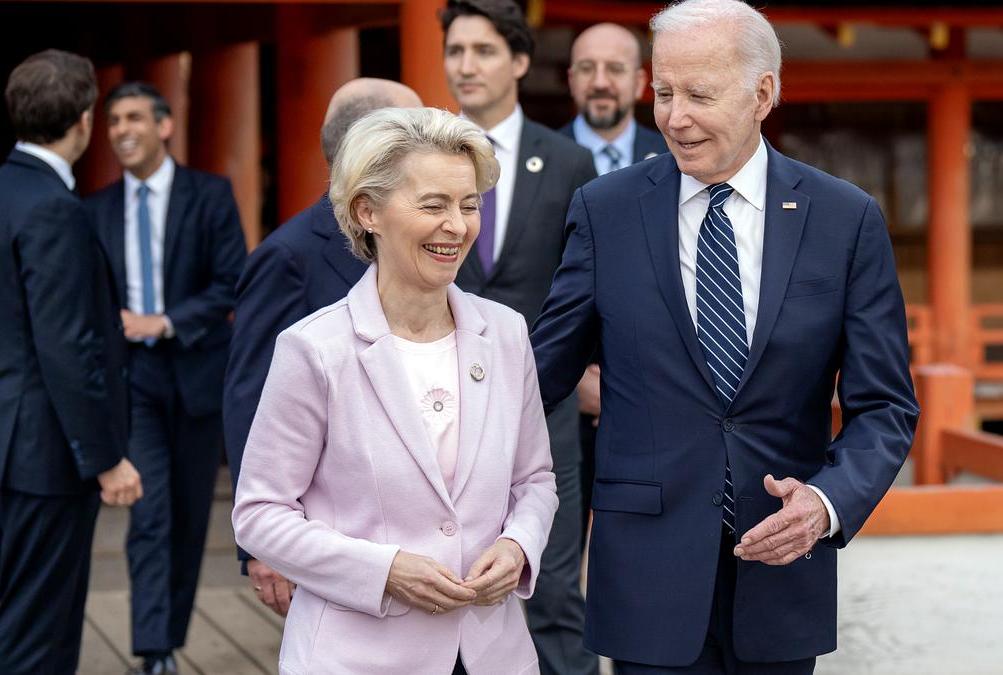
Wang Lei, Assistant Research Fellow, Institute of World Political Studies, CICIR
Sun Ru, Research Professor & Deputy Director, CICIR
Jun 08, 2023
Adjustments in European and American strategies may offer hope for a return to normal relations with China. The EU and U.S. should dump their political prejudices against China, take care of the common security of the world, try to remove risks and truly cooperate with China.

Zhao Tong, Fellow, Carnegie–Tsinghua Center for Global Policy
Jun 08, 2023
Managing uncertainties in China-U.S. ties will require the U.S. to accept all-around bilateral dialogue and exchanges between the two countries’ national leaders, experts, scholars and the general public. It needs to identify the true sources of significant disagreements and eliminate its misreading of China.

Stephen Roach, Senior Fellow, Yale University
Jun 08, 2023
Setting up a new joint secretariat could be key to keeping engagement between the world's leading economies on track.
James Hinote, Geopolitical Strategist
Jun 06, 2023
Brazilian President Lula da Silva traveled to Shanghai and Beijing in early April, where his delegation signed 15 agreements across a range of sectors, including several aimed at decreasing reliance on the U.S. dollar, U.S. agricultural exports, and U.S. financial institutions. These agreements represent Brazil and China drawing closer and providing alternatives to each other that can circumvent U.S. controls and norms.
Hugh Stephens, Distinguished Fellow, Asia Pacific Foundation of Canada
Jun 06, 2023
China’s relationship with Canada has been suffering for the last few years under the weight of tit-for-tat sanctions and expulsions of officials. Whether or not the two countries will continue this descent will depend on China’s plans to influence policy abroad, and Canada’s appetite for confrontation with the world’s largest exporting economy.
Philip Cunningham, Independent Scholar
Jun 06, 2023
China recently hosted the Central Asia summit, while Japan simultaneously held a meeting between G7 leaders. Both summits were successful on their own terms, and both teach us something about the geographic and political realities of the two respective host countries.
Sebastian Contin Trillo-Figueroa, Geopolitics Analyst in EU-Asia Relations and AsiaGlobal Fellow, The University of Hong Kong
Jun 06, 2023
Europe is altering its China policy to reduce reliance on vital technologies, while seeking a balance between protecting its interests and fostering cooperation. And by shifting the relationship, we have the opportunity to heal divisions, and prioritize shared interests that have been, expressed, ultimately benefiting everyone involved.
Jun 06, 2023
Tensions between China and the West are being reinforced as assumptions about economic cooperation give way to national security rhetoric. Broad decoupling would be too difficult and costly for the West, while selectively reducing dependence on China in critical areas is seen as a more achievable goal.
Zhu Zhongbo, Director, Department for International and Strategy Studies, China Institute of International Studies
Jun 06, 2023
Legislators in Washington should cease and desist in their political maneuverings on Taiwan. It’s only making things worse. Undermining the political credibility of the United States and damaging the interests of the American people is a dubious distinction indeed.
Nathaniel Schochet, Analyst and CJPA Global Advisors
Earl Carr, Founder and Chief Executive Officer at CJPA Global Advisors
May 31, 2023
The Biden administration recently wrapped up two important state visits with President Yoon Suk Yeol of South Korea and President Ferdinand Marcos of the Philippines. The meetings signify that Biden is on a trek to improve and affirm ties with key Indo-Pacific countries, but it must continue this trend if the U.S. wishes to remain relevant in the region.
Back to Top

- China-US Focus builds trust and understanding between the U.S. and China through open dialogue among thought leaders.
- Our Offerings
- Topics
- Videos
- Podcasts
- Columnists
- Research Reports
- Focus Digest
- Stay Connected
-
Thanks for signing up!
- Get the latest stories from China-US Focus weekly.